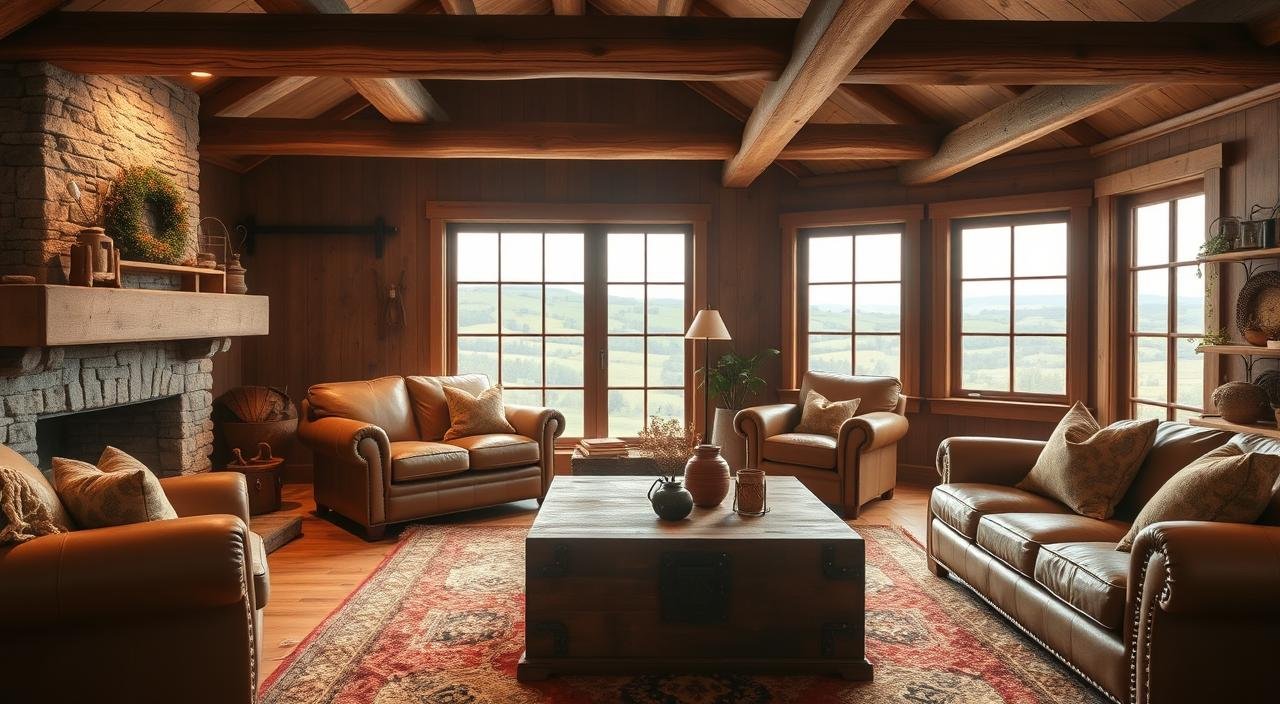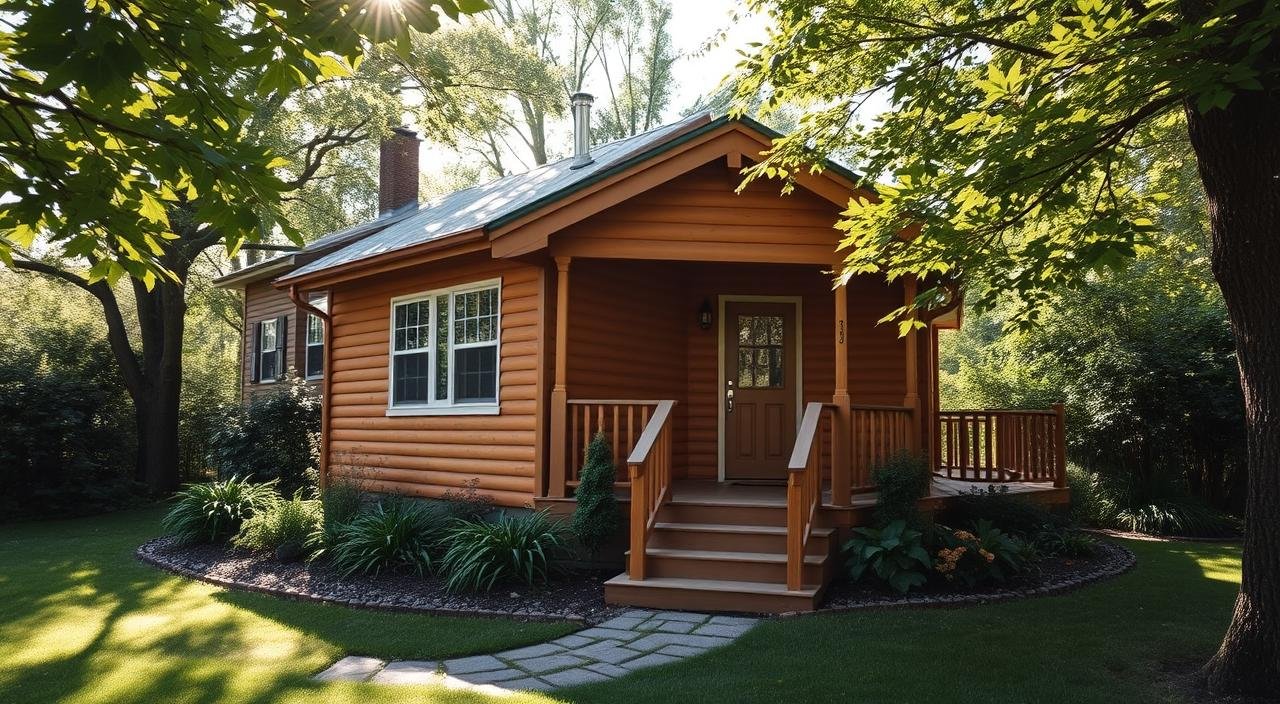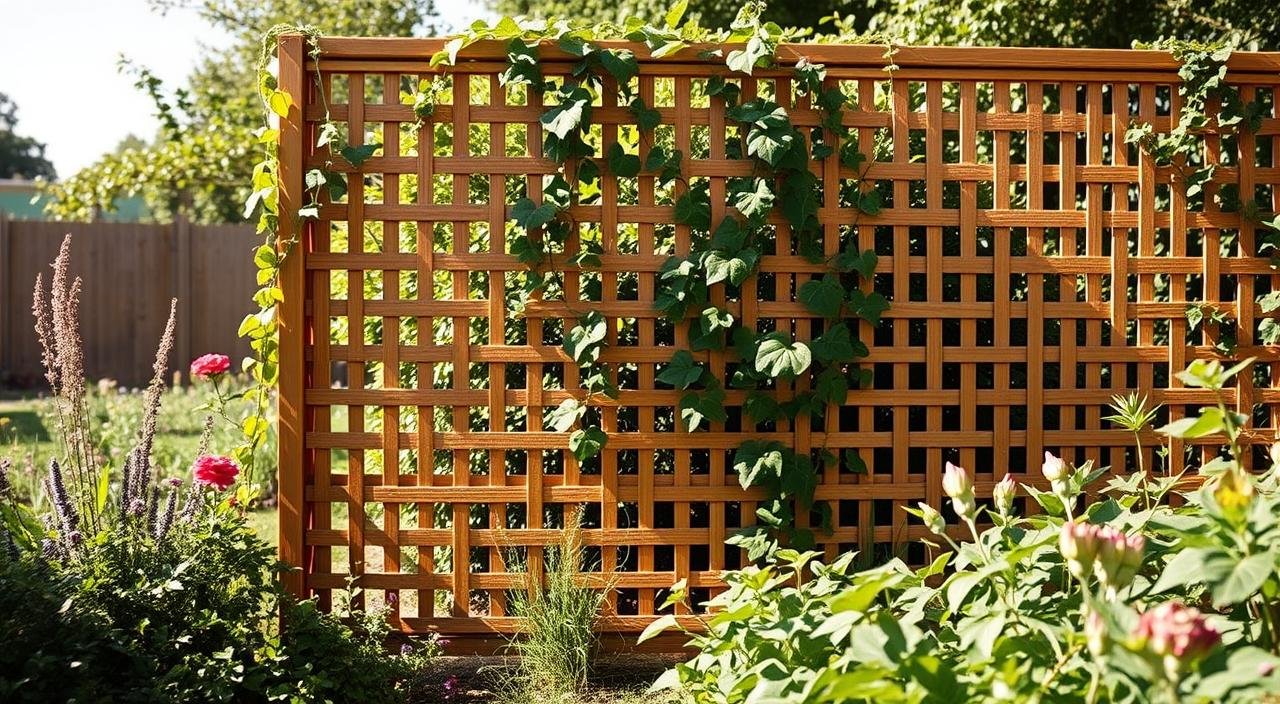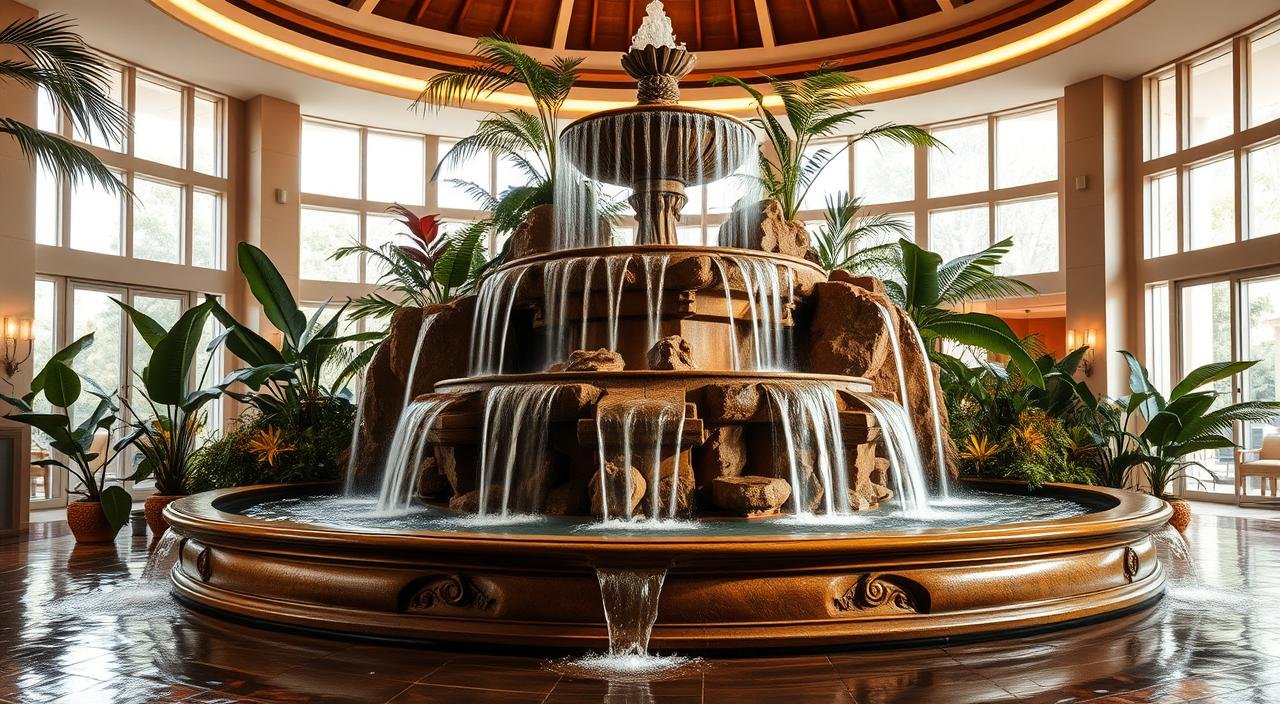Elevate Your Farmhouse Living Room with These Stunning Ideas
Can a city apartment or suburban home truly capture the warmth of a farmhouse style living room without looking out of place? The answer might surprise you. Farmhouse design isn’t just for country estates—it’s a versatile blueprint for blending rustic charm with modern living. Think reclaimed wood beams paired with sleek sofas, or weathered dressers holding sleek tech. This style isn’t about pretending you’re on a farm; it’s about creating a space that feels lived-in yet stylish.
Key Takeaways
- Reclaimed wood adds history without breaking the bank
- Shiplap walls can instantly boost a room’s country charm
- Mix metals like iron and brass for modern-rustic contrast
- Soft textures like bouclé balance hard materials
- Unconventional seating like swings creates personality
At its heart, farmhouse style is about making spaces feel both welcoming and intentional. Whether you’re starting fresh or updating a dated space, this guide shares expert tips for achieving that sought-after blend of authenticity and elegance. Ready to turn your living room into a sanctuary that feels like it’s been evolving for decades—not days? Let’s get started!
The Timeless Appeal of Farmhouse Style Living Rooms
Ever wonder why farmhouse style remains timeless? It’s not just a fleeting trend; it’s a way of life. Step into a farmhouse style living room and witness the fusion of weathered wood and modern lines. This unique blend of rustic allure and contemporary functionality continues to attract homeowners.
Why Farmhouse Style Continues to Captivate Homeowners
Imagine a space where reclaimed wood beams grace a sleek sofa, or a vintage ladder supports your treasured books. This is the essence of farmhouse style—it celebrates history without being bound by it. SpryInterior’s offerings, such as their barnwood coffee tables and handmade pottery, facilitate the seamless integration of vintage and modern elements. It’s a space that’s both inviting and practical, embracing the imperfections of real life.
The Evolution of Farmhouse Design Through the Decades
From its 19th-century origins to today’s modern farmhouse design, this style has evolved. Initially, it emphasized durability and natural materials. Today, it combines exposed brick with minimalist decor or industrial stools alongside a clawfoot tub. The essence remains unchanged—authenticity and comfort—but the execution is constantly evolving.
Balancing Rustic Charm with Modern Sensibilities
- Pair a sleek leather sofa with a reclaimed wood coffee table.
- Add industrial touches like iron lighting to contrast with soft textiles.
- Layer textures: mix burlap, linen, and polished concrete for depth without clutter.
“Farmhouse style isn’t about copying—it’s about storytelling through objects that matter,” says SpryInterior’s design team.
To achieve this balance, begin with a neutral palette—whites and grays—and then introduce vintage pieces like a weathered sign or a midcentury side table. Modern farmhouse design excels at this harmony. Aim for a space that feels lived-in yet uncluttered. Ready to merge the old with the new? Let’s dive into the creative process!
Essential Elements of a Farmhouse Style Living Room
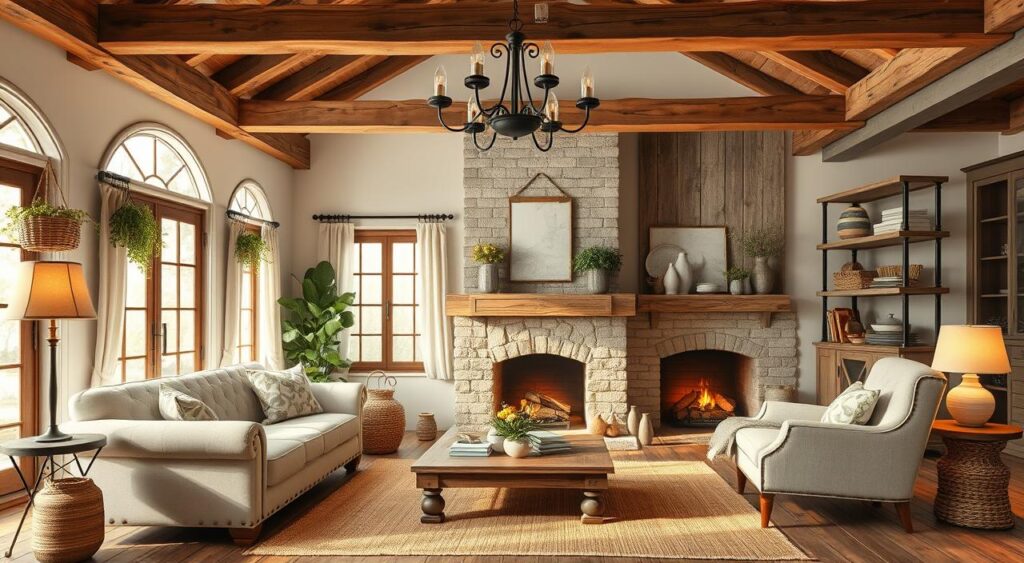
Creating a farmhouse style living room involves understanding its core elements. Let’s explore the three key components that bring coziness and timelessness to your space. Are you ready to transform your living room? Let’s begin.
Natural Materials and Textures
The essence of farmhouse charm lies in raw, organic materials. Reclaimed wood is a standout, whether it’s used for accents or vintage tables. Pair it with rustic decor essentials like linen upholstery. To enhance the look, mix textures boldly. For example, smooth cotton throws over a leather sofa or a stone fireplace with soft wool rugs from Surya.
Designer Lubin advises, “Layer materials like a story—each piece adds a chapter to your space.” This approach ensures a rich, layered look.
Architectural Details That Define the Style
| Element | Description | Modern Twist |
|---|---|---|
| Exposed Beams | Rough-hewn wood accents | Painted white for contrast |
| Shiplap Walls | Traditional board-and-batten cladding | Distressed finishes |
| Open Shelving | Built-in display units | Combined with minimalist storage |
The Perfect Balance of Form and Function
- Storage solutions: Use RH’s sleek sofas with hidden storage
- Lighting: Currey & Company’s rustic chandeliers
- Seating: Oversized armchairs that double as conversation starters
A functional farmhouse style living room is more than just aesthetically pleasing. It’s a space that evolves with you. Incorporate a vintage ladder for high shelves or a modern sectional with a reclaimed-wood coffee table. The key is balance—each piece should enhance both beauty and functionality.
Creating the Ideal Color Palette for Farmhouse Charm
Color is the secret ingredient that ties together every element of farmhouse chic decor. Begin by selecting neutrals such as soft whites, warm grays, or muted beiges as your foundation. These colors form the 60% base in the 60-30-10 rule. Imagine a light gray wall complementing a reclaimed wood mantel, or a pale ivory ceiling framing rustic beams. This neutral base creates the signature cozy farmhouse living vibe, allowing for personal touches.
“Soft whites, warm grays, and muted beiges create a calm backdrop, while natural greens or rich navy blues add warmth,” says interior designer Emily Lubin. “It’s about balance—never overwhelming.”
For accent hues, consider earthy tones like moss greens or terracotta (those trendy 2025 picks!). These colors are your 10% pop. Benjamin Moore’s Distant Gray paired with a sage green throw pillow is a winning combination. Mixing textures like linen curtains or wool rugs adds depth without loud colors. And don’t skip testing! Hang fabric swatches next to your sofa for weeks to see how light changes their look.
Love bold shades? Try navy-blue throw blankets or burnt-orange accent chairs—they’re budget-friendly updates. For a French Country twist, pale blue cabinets bring charm even on a tight budget. Remember: neutral walls let furniture and decor—a timeless farmhouse principle.
Ready to experiment? Layer warm neutrals like cream walls with a terracotta side table. Or add a navy accent wall in small doses. The key? Let your palette feel like a hug for the senses. Start with a sample on your wall—yes, that simple step can transform your space!
Statement Furniture Pieces for Your Farmhouse Haven
Designing your farmhouse living space requires standout furniture pieces. These elements are key to combining farmhouse furniture that’s both stylish and inviting. Laura Lubin of Ellerslie Interiors notes, “Your sofa sets the tone for cozy farmhouse living—it needs to feel like a hug you don’t want to leave.”
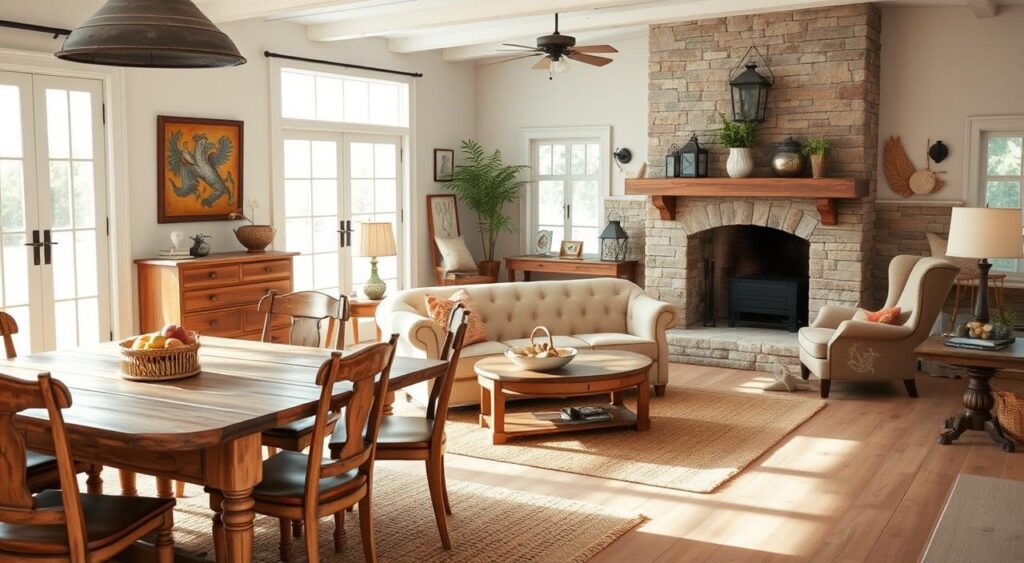
Selecting the Perfect Farmhouse Sofa
Begin with a sofa that offers both durability and charm. Choose linen or leather fabrics in neutral tones for their ease of cleaning and timeless appeal. Slipcovers are highly recommended for families, adding rustic texture while allowing for seasonal refreshes. Seek out deep seating and rolled arms for that quintessential farmhouse look.
Coffee Tables That Tell a Story
Invest in a coffee table that’s both functional and visually striking. Opt for a reclaimed wood table with visible nail holes or a vintage iron base to transform ordinary gatherings into memorable moments. Adding a trunk or ladder-style table instantly infuses your space with farmhouse charm.
Storage Solutions with Rustic Appeal
Move beyond conventional bookshelves:
- Floating shelves with open displays
- Built-ins with natural wood grain
- Distressed finishes for layered decor
Stack books, vases, and plants to create dynamic vignettes that showcase your personal style.
Accent Furniture That Completes the Look
Small pieces can have a significant impact. A rustic side table by the sofa, a ladder-turned-display rack, or a vintage mirror above the mantel add distinct personality. Combine flea market finds with sleek modern lamps to balance tradition and trend.
Every piece should carry a sense of history, even if it’s new. Blend antiques with fresh fabrics and embrace bold textures. When practicality meets soul, your space transforms into a true sanctuary.
The Magic of Shiplap: Transforming Walls with Farmhouse Character
Shiplap walls are a key element in farmhouse style, adding warmth and texture instantly. These horizontal planks, originally used in barns, now transform ordinary farmhouse style living rooms into cozy, storybook spaces. Ready to try it? Let’s dive in!
DIYers, rejoice! Installing shiplap is easier than you think. Grab pre-primed MDF panels from Home Depot or Lowe’s and follow step-by-step guides like this 10-step tutorial. A weekend project can completely reinvent your space—imagine the shiplap walls reflecting firelight in your living room by Sunday night!
White is classic, but don’t stop there. Try:
- Soft grays for a modern twist
- Warm oak tones paired with copper accents
- Neutral stains that highlight wood grain
Short on space? Opt for accent walls—just one wall can anchor the room. Mix materials ly: pair shiplap with
- Beadboard trim around windows
- Exposed brick for contrast
- Reclaimed wood shelves for dimension
Can’t commit to real wood? Try peel-and-stick vinyl panels from brands like Behr or Sherwin-Williams. They mimic the look perfectly and peel off easily if you change your mind.
Stil hesitant? Think of shiplap as your budget-friendly upgrade. A 4×8 sheet costs under $20—and watch that blank wall become your new favorite backdrop for farmhouse decor. Your living room will thank you!
Flooring Choices That Ground Your Farmhouse Style Living Room
Your floor is the foundation of any rustic decor—it ties together every element of your farmhouse style living room. I’ve seen countless spaces transformed by flooring that balances texture and practicality. Let’s explore how to choose materials that feel both timeless and tailored to your space.
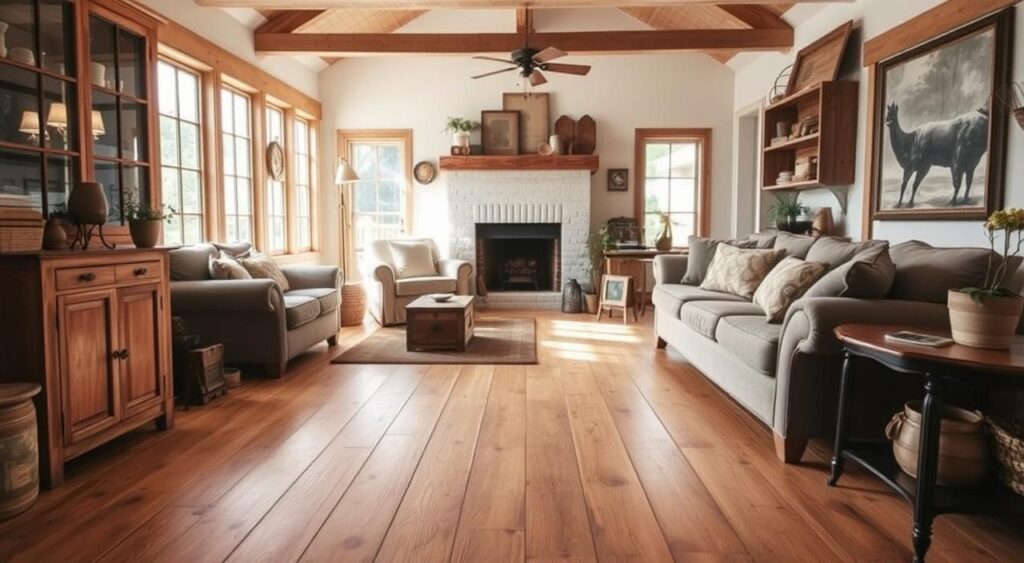
“A floor should feel like a story—each material choice reflects the room’s soul.”
Here’s how to pick the perfect match:
- Wood Flooring: Opt for wide-plank hardwood like white oak or hickory. Look for natural imperfections like knots or graining—they add organic warmth.
- Luxury Vinyl Plank (LVP): A budget-friendly option mimicking distressed oak or weathered pine. It’s durable underfoot yet fits snugly with rustic decor.
- Engineered Hardwood: Ideal for moisture-prone areas, this combines a wood veneer with a sturdy core. Try matte-finished planks for a muted elegance.
- Natural Textures: Layer handwoven jute rugs over light wood floors. Vintage Oushak rugs add drama, while seagrass mats bring coastal farmhouse charm.
- Creative Patterns: Checkerboard tiles in cream and charcoal or staggered brick-patterned porcelain tiles add visual interest without overwhelming the space.
Remember—your flooring isn’t just functional. It’s a canvas for your farmhouse style living room. Mix materials thoughtfully: pair raw concrete accents with soft wool rugs or blend reclaimed wood with sleek matte tiles. Let the floor anchor your space while inviting you to kick off your shoes and stay a while.
Lighting Fixtures That Enhance Farmhouse Ambiance
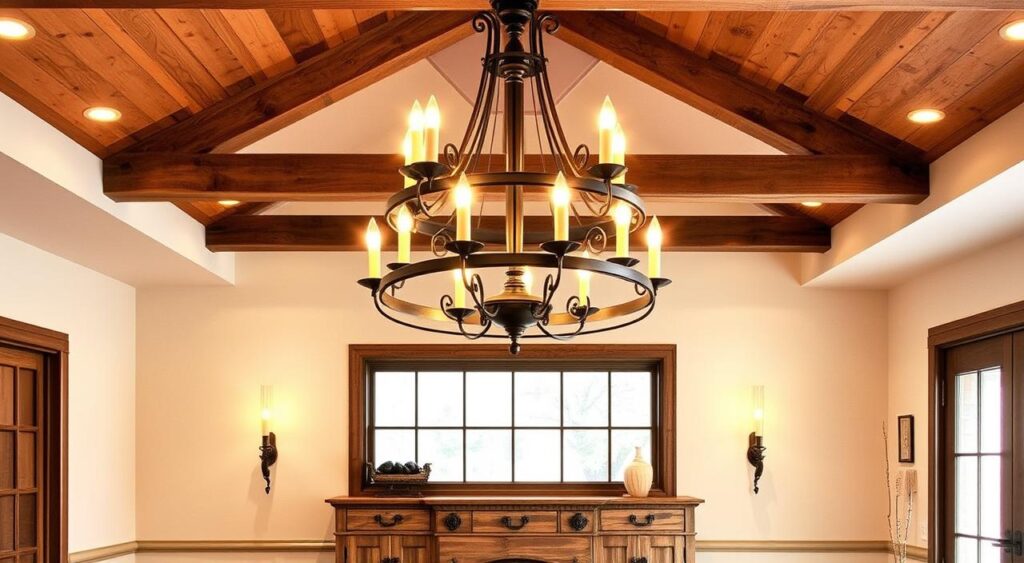
Lighting is more than just brightness; it’s the essence that transforms farmhouse spaces into cozy havens. We’ll explore fixtures that merge rustic charm with modern elegance.
“Lighting is the soul of farmhouse style—it’s where rustic meets warmth.”
Begin with pendant lights and chandeliers that serve as room anchors. The Quincy Collection’s Modern Farmhouse Chandelier in Charcoal or Brushed Nickel offers instant farmhouse chic. Mixing metals like brass or weathered bronze adds a vintage touch.
Pendant and Chandelier Options for Farmhouse Spaces
Fixtures like the Quincy Collection’s 20.5”H pier light or the Bristol Collection’s square pendant draw attention. Choose clear glass shades and exposed bulbs for a classic look.
| Fixture | Dimensions | Finish | Collection |
|---|---|---|---|
| Modern Farmhouse Chandelier | 40-1/2″ x 35-1/4″ | Charcoal | Adelaide |
| Outdoor Wall Light | 20″H x 7″W | Black | Quincy |
| Pendant Light | 11-7/8″H x 6-1/2″W | Estate Bronze | Bristol |
Table and Floor Lamps with Rustic Appeal
Add table lamps with drum shades or iron bases, featuring reclaimed wood accents. Floor lamps with wrought-iron frames enhance height without overwhelming the area.
Natural Light Maximization in Farmhouse Design
Embrace natural light by using sheer curtains and light walls. Large windows, combined with farmhouse chic decor like striped textiles, create an open feel.
Combine soft and task lighting for a space that’s both stylish and practical. Are you ready to illuminate your farmhouse sanctuary?
Textiles and Soft Furnishings for Cozy Farmhouse Living
Adding textiles is where farmhouse style truly warms up! Think chunky knits, soft throws, and layered fabrics that transform any room into a country charm living room. Let’s break down how to pick pieces that feel both luxurious and lived-in.
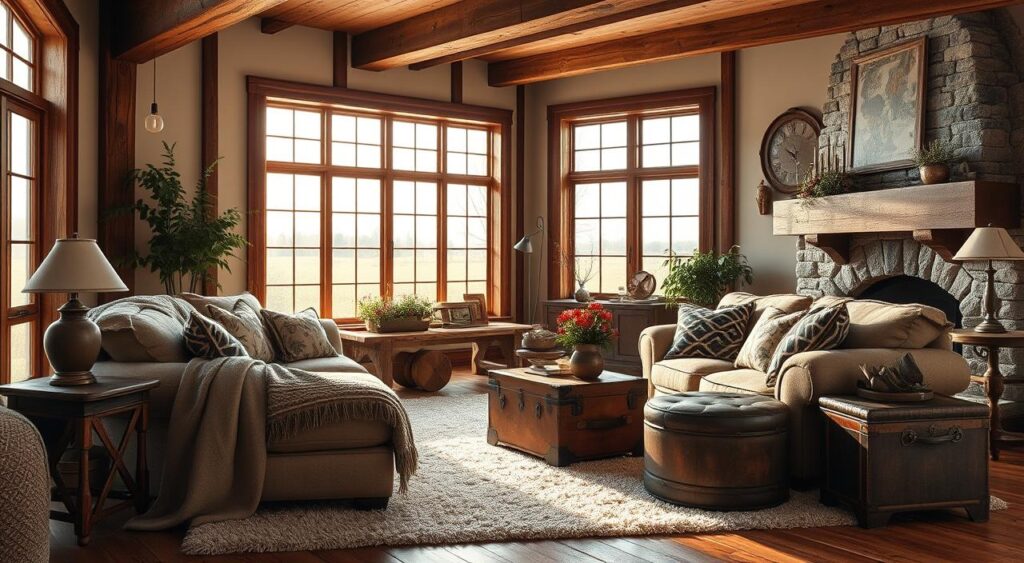
Selecting the Perfect Area Rug
Rugs are your first layer of warmth. Choose neutral-toned jute or wool rugs for durability, then layer smaller patterned rugs on top. Need proof? Silk and velvet upholstery mixed with rustic fibers create that “lived-in” vibe without breaking the bank.
- Opt for jiddle geometric patterns or solid jute bases
- Add seasonal patterned rugs for instant updates
- Layer rugs in large rooms to eliminate cold spots
Curtain Styles That Complement Country Charm Living Room
Windows deserve texture too! Try these options to let light dance while keeping the rustic vibe:
| Style | Material | Effect |
|---|---|---|
| Sheer gauze | Linen or cotton | Soft light diffusion |
| Plaid valances | Wool blends | Instant pattern contrast |
| Striped shutters | Jute or burlap | Unpretentious charm |
Throw Pillows and Blankets for Seasonal Updates
Swap out pillows and throws to keep your space fresh! Here’s how:
- Spring/Summer: Lightweight cotton throws + floral-print pillows
- Fall/Winter: Plaid wool blankets + velvet toss pillows
- Neutral bases let bold patterns stand out without overwhelming
Don’t forget texture layers! Pair a chunky-knit throw with a smooth velvet cushion—they play off each other beautifully. These small swaps keep your cozy farmhouse living space ever-evolving without major overhauls!
Vintage Treasures: Incorporating Antiques into Your Farmhouse Space
Imagine a weathered oak sideboard next to a sleek glass dining table. This blend of old and new creates a vintage farmhouse aesthetic that’s both nostalgic and modern. Designer Lubin notes, “Combining heirlooms with modern items makes spaces feel lived-in yet uncluttered.”
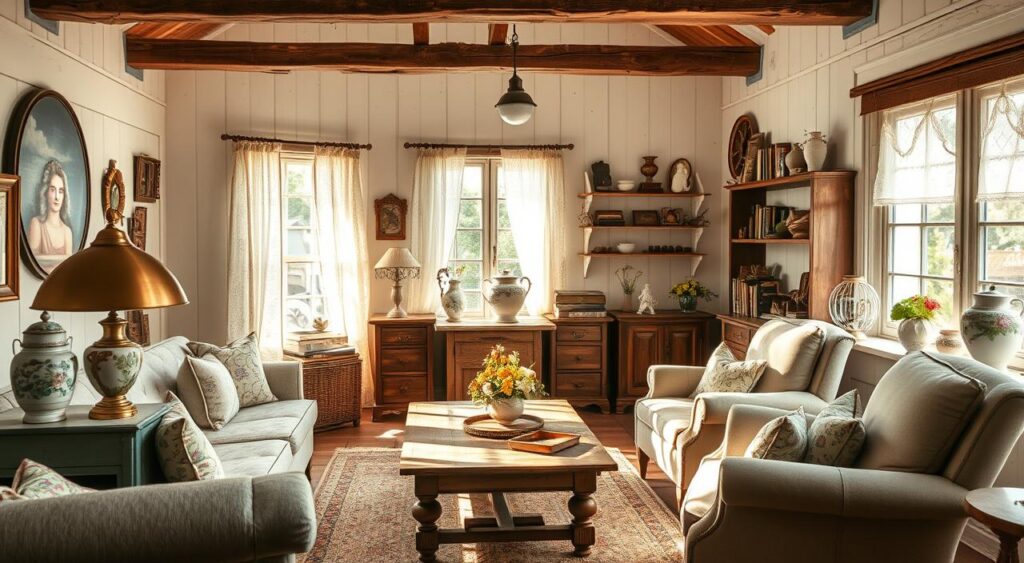
- Pair ornate clawfoot tubs with minimalist sinks for bathroom 70s-inspired farmhouse chic decor touches
- Style mantels with vintage dough bowls filled with fresh flowers
- Repurpose old shutters as wall art beside abstract modern paintings
| Vintage Element | Modern Pairing | Result |
|---|---|---|
| Distressed wood chairs | Polished chrome light fixtures | Warmth + sleekness |
| Embroidered tapestries | Industrial metal shelves | Textural contrast |
| Rustic wrought iron | Geometric glass vases | Traditional-meets-modern balance |
Antiques serve as conversation pieces. Pair a mid-century trunk with a contemporary sofa, or drape a woolen Navajo blanket over a steel bed. A neutral base palette enhances the impact of these pieces. A 1950s side table paired with a marble desk exemplifies farmhouse chic.
A vintage secretary desk next to a modern laptop station adds instant charm. Textiles also play a key role—try turning a retro grain sack into a pillow cover. This guide offers more ideas for creative textile uses.
Modern Farmhouse vs. Traditional: Finding Your Perfect Style Balance
Ever pondered blending rustic charm with modern flair in your farmhouse style living room? Let’s explore the contrasts between modern farmhouse design and traditional styles. This way, you can create a space that truly reflects your unique taste.
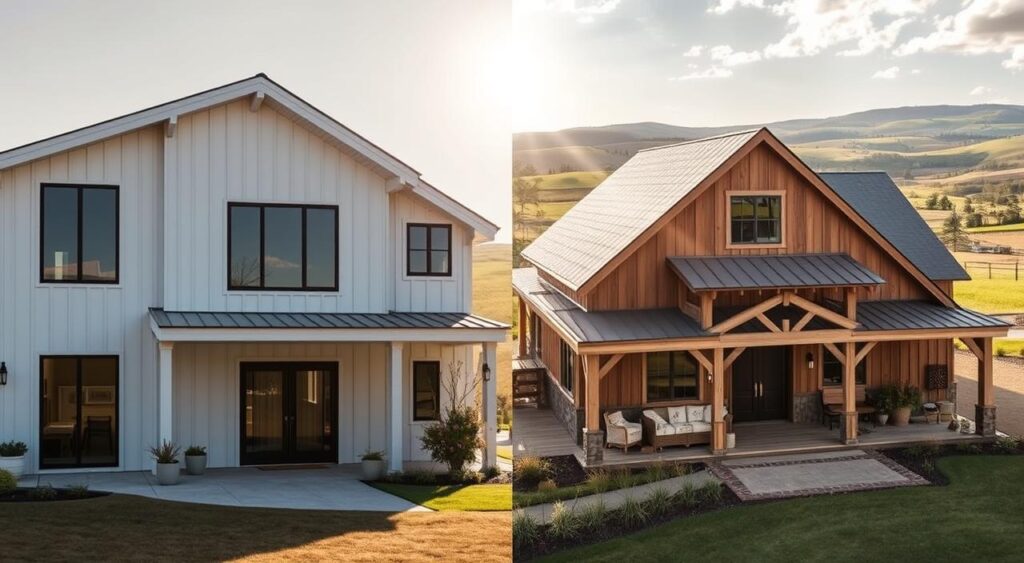
“The best farmhouse spaces don’t follow rules—they tell your story,” says interior designer Sarah Lin. “Balance is the secret to avoiding a room that feels stuck in time or too trendy.”
| Classic Farmhouse | Modern Farmhouse |
|---|---|
| Distressed wood, vintage accents | Clean lines, sleek finishes |
| Muted earth tones | Neutral palettes with bold color pops |
| Vintage furniture (e.g., spindle-back chairs) | Minimalist seating with modern upholstery |
Key Differences That Define Each Style
Classic farmhouse celebrates nostalgic elements like exposed brick and weathered finishes. Modern farmhouse, on the other hand, focuses on simplicity, with an emphasis on open spaces and farmhouse style living room essentials. It’s a modern twist on tradition.
Blending Elements for a Personalized Look
- Mix a reclaimed wood coffee table with a sleek glass-top dining table
- Pair a vintage quilt with a geometric-patterned throw pillow
- Use industrial pendant lights over a farmhouse-style dining set
Designer Tips to Avoid Overdoing It
Here’s how to stay stylish without going overboard:
- Stick to 1-2 standout rustic pieces (like a weathered barn door)
- Balance flea-market finds decor with sleek modern art pieces
- Use neutral walls as a canvas for mixing patterns and eras
Your modern farmhouse design should mirror your personality. Need guidance? Begin by selecting a focal point, such as a farmhouse-style mantel or a mid-century sofa. Then, build your design around it!
Accessorizing Your Farmhouse Style Living Room Without Clutter
Accessorizing a farmhouse living room can be a delicate dance. How do you infuse personality without drowning in clutter? I’ve gathered my top farmhouse chic decor tips to ensure your space feels inviting and purposeful, not cluttered.
“Don’t forget a strong focal point, whether it’s a stone fireplace or a large piece of artwork, to ground the room and bring in that farmhouse charm.” – Lubin
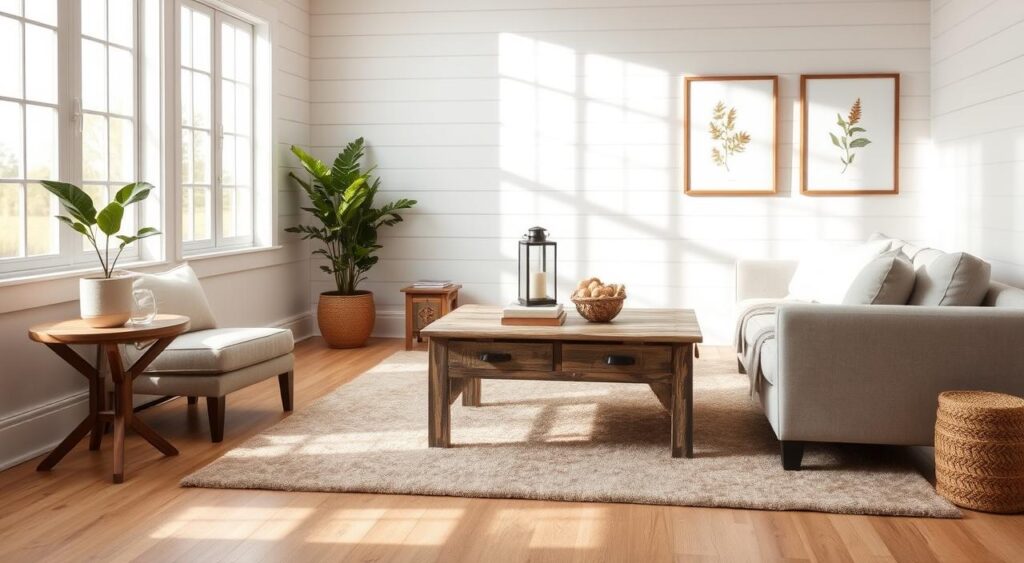
- Begin with a focal point like a stone fireplace or a gallery wall. This draws the eye away from clutter, adding instant charm.
- Layer in textures: Sheepskin rugs, woven baskets, and linen throws add visual interest without overwhelming the space.
- Opt for functional storage solutions—coffee tables with shelves or woven baskets serve as decor and clutter hiders.
- Introduce one or two vintage finds (like a weathered tray or antique pitcher) to create a collectedible vibe without overdoing it.
- Use neutrals as your base. A white slipcovered sofa or light wood coffee table provides a clean canvas for your decor.
- Add life with greenery—small potted plants or a fiddle leaf fig add life without taking up too much space.
Balance is essential! Let your favorite items take center stage by keeping most pieces hidden. A well-placed woven basket, a few well-chosen throw pillows, and that focal point are all you need. A well-curated space should feel cozy, not chaotic. Trust me, less is more in farmhouse chic decor!
Seasonal Updates to Keep Your Farmhouse Living Room Fresh Year-Round
Ever ponder how to keep your cozy farmhouse living area lively without a complete overhaul? We’ll explore simple swaps to revitalize your country charm living room with each season’s essence. Swapping textiles or introducing fresh blooms can transform your space into a new haven!

Spring and Summer Farmhouse Refreshes
Spring heralds a time for lightness and renewal. Replace thick throws with linen pillows and install airy, sheer curtains. Incorporate botanical prints in soft greens or pastels, reminiscent of a watercolor piece from Hobby Lobby. Galvanized planters with herbs or flowers bring nature indoors. Natural-toned books on a coffee table enhance the country charm living room ambiance.
Fall and Winter Cozy Farmhouse Touches
With the onset of fall, introduce texture with sisal rugs and wool blankets. Adorn your space with twigs in mason jars or weathered candlesticks from Magnolia Market. A twig wreath with dried oranges infuses autumnal warmth. For winter, incorporate faux fur throws and group pumpkins with cinnamon sticks for a sensory delight.
Holiday Decorating with Farmhouse Flair
Adorn mantles with garlands of faux greenery—add ceramic fruits under glass domes for a rustic flair. Replace neutral pillows with red or gold hues, balanced by wooden accents like a painted ladder holding stockings. A vintage watering can vase with pinecones is a stroke of genius. Embrace simplicity—blend new decor with cherished pieces.
Small adjustments can significantly enhance your space. Allow your living area to evolve seasonally, yet remain faithful to farmhouse’s enduring appeal. Ready to revamp your space? Begin with one idea this week!
Conclusion: Creating Your Personal Farmhouse Haven That Stands the Test of Time
Embarking on the journey to create your perfect farmhouse style living room requires a harmonious blend of rustic charm and contemporary functionality. Your space should mirror your unique personality, whether you lean towards a cozy country vibe or a more refined rustic elegance. Opt for neutral hues such as soft grays, whites, and earthy beiges to serve as a foundation. This backdrop allows textures and accents to take center stage.
Integrating reclaimed wood furniture with modern pieces or placing a vintage mirror above a stone fireplace can beautifully merge past and present. This approach ensures your space feels both timeless and current. The key to a successful farmhouse design lies in its texture. Incorporate elements like woven baskets, chunky knit throws, or a jute rug to add depth without overwhelming the room.
Lighting plays a critical role in setting the mood. Consider a wrought-iron chandelier or solar string lights for that warm, inviting ambiance. Personal touches, such as displaying heirloom dishes on open shelves or creating a family photo gallery, are essential. This style is about creating a space that feels genuine and lived-in, not just following fleeting trends.
Adopting a country charm living room aesthetic is accessible, even in smaller spaces. Small apartments can incorporate farmhouse-style elements like a desk or a botanical print gallery wall. Begin with a distressed accent chair or a set of mason jar vases. Gradually add more pieces as you discover your preferences. The aim is to craft a space that evolves with you, combining comfort and character over time.
